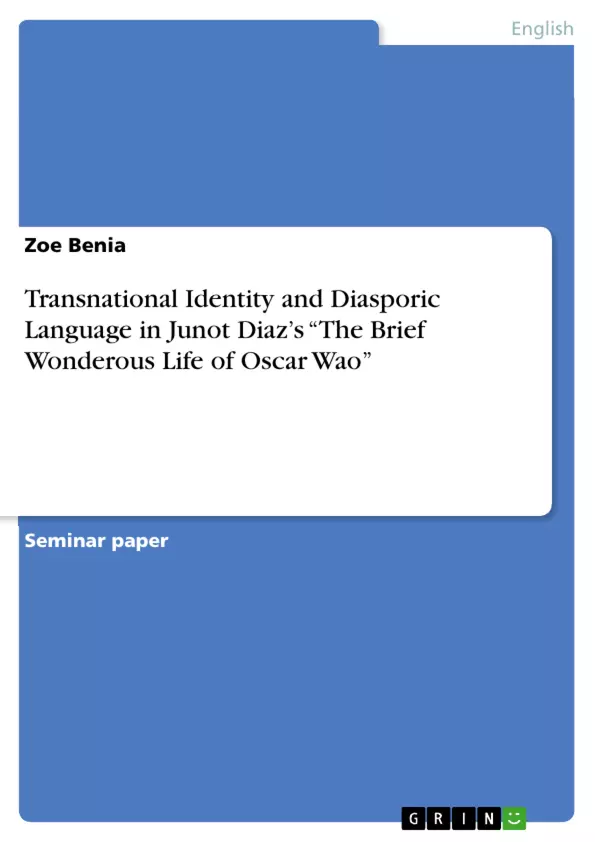This text discusses the struggle of transnational identity and the use of diasporic language in Junot Diaz’s “The Brief Wonderous Life of Oscar Wao”.
Junot Diaz’s “The Brief Wonderous Life of Oscar Wao” which won the Pulitzer Prize in 2008, concentrates on the hard lives of those who leave and those who were left behind. Many immigrants must face a difficult life, far away from their motherland.
Junot Diaz, who was born in Santo Domingo, Dominican Republic, presents a story of a “smart bookish boy of color in a contemporary U.S. “getto”, who struggles with his transnational identity. If we talk about transnational identity or transnational people, it refers to people who identify themselves with more than one country.
Table of Contents
- Introduction
- Transnationalism in The Brief Wonderous Life of Oscar Wao
- The Curse Fukù
- Trujillo's influence on the characters, regarding the curse
- Transnational Identity
- Language of Diaspora in The Brief Wonderous Life of Oscar Wao
- Conclusion
- References
Objectives and Key Themes
This literary paper aims to analyze the transnational processes and the use of diasporic language in Junot Díaz's "The Brief Wonderous Life of Oscar Wao." The paper examines how the curse Fukù shapes the lives of the characters, focusing particularly on the protagonist Oscar de León and his family.
- The impact of Trujillo's dictatorship on Dominican society and the transnational experiences of its people
- The development of transnational identity in the context of the Dominican diaspora
- The role of language in expressing and negotiating transnational identity
- The influence of Magic Realism in the novel's narrative style
- The significance of the curse Fukù as a symbol of historical trauma and cultural identity
Chapter Summaries
The introduction of the paper sets the stage by exploring the complex realities of transnational identity and the immigrant experience. It presents Oscar Wao's struggles as a "smart bookish boy of color in a contemporary U.S. 'getto'" (Diaz 22), highlighting the challenges of navigating multiple cultural identities. The introduction also emphasizes the importance of understanding the historical context of Dominican society, particularly the influence of Trujillo's dictatorship and the impact of the slave trade on the formation of Dominican culture.
Chapter 2 delves into the concept of transnationalism and its impact on the lives of the characters in "The Brief Wonderous Life of Oscar Wao." It examines the role of the curse Fukù in shaping their experiences, exploring its origins and significance within the Dominican diaspora. The chapter also analyzes how Trujillo's regime influenced the characters, particularly their sense of identity and their decisions to emigrate.
Chapter 3 focuses on the use of diasporic language in the novel, examining how Diaz utilizes language to convey the complexities of transnational identity and the experiences of Dominican immigrants in the United States. The chapter explores the influence of Junot Diaz's own experiences as an immigrant on his writing style and his use of code-switching and slang.
Keywords
The key terms and concepts explored in this literary paper include: transnationalism, diaspora, Dominican identity, Trujillo's dictatorship, the curse Fukù, Magic Realism, language, and code-switching.
Frequently Asked Questions
What is the central theme of "The Brief Wondrous Life of Oscar Wao"?
The novel explores the struggle with transnational identity and the immigrant experience, focusing on Oscar de León and his family's history.
What does "transnational identity" mean in this context?
It refers to people who identify with more than one country or culture, often navigating the complexities of their motherland and their new home.
What is the significance of the "Fukù" curse?
The Fukù is presented as a curse that shapes the lives of the characters, serving as a symbol for historical trauma and Dominican cultural identity.
How does the author use "diasporic language"?
Junot Díaz utilizes code-switching, slang, and a mix of English and Spanish to convey the complex reality of the Dominican diaspora in the U.S.
What role does Trujillo's dictatorship play in the novel?
Trujillo's regime is a major historical influence that impacted Dominican society and drove the transnational experiences of the characters.
- Arbeit zitieren
- Zoe Benia (Autor:in), 2020, Transnational Identity and Diasporic Language in Junot Diaz’s “The Brief Wonderous Life of Oscar Wao”, München, GRIN Verlag, https://www.grin.com/document/1001715



